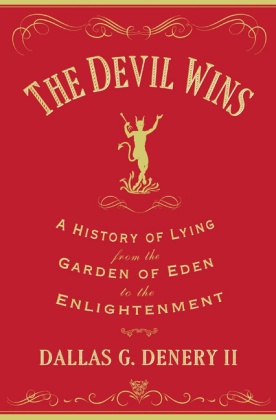Read more
For medieval and early modern Christians, the problem of the lie was the problem of human existence itself. To ask "Is it ever acceptable to lie?" was to ask how we, as sinners, should live in a fallen world. As it turns out, the answer to that question depended on who did the asking. The Devil Wins uncovers the complicated history of lying from the early days of the Catholic Church to the Enlightenment, revealing the diversity of attitudes about lying by considering the question from the perspectives of five representative voices--the Devil, God, theologians, courtiers, and women. Examining works by Augustine, Bonaventure, Martin Luther, Madeleine de Scudéry, Jean-Jacques Rousseau, and a host of others, Dallas G. Denery II shows how the lie, long thought to be the source of worldly corruption, eventually became the very basis of social cohesion and peace.
List of contents
Acknowledgments ix Introduction: Is It Ever Acceptable to Lie? 1 Part One: Theologians Ask the Question Chapter One. The Devil 21 Six Days and Two Sentences Later 21 The Devil and the Lie 22 Making Sense of Genesis 1, 2, and 3 28 The Devil's Lie from Late Antiquity to the Middle Ages 35 The Devil's Lie from the Middle Ages to the Reformation 47 The Prince of This World 52 From Satan's Stratagems to Human Nature 55 Chapter Two. God 62 Can God Lie? 62 On Lions, Fishhooks, and Mousetraps 67 Divine Deception and the Sacrament of Truth 77 Luther, Calvin, and the Hidden God 88 Rene Descartes, Pierre Bayle, and the End of Divine Deception 94 Chapter Three. Human Beings 105 Every Lie Is a Sin 105 Every Sin Is a Lie 110 Biblical Liars 116 Augustine among the Scholastics 119 Institutional Transformations 131 Equivocation, Mental Reservation, and Amphibology 135 From Pascal to Augustine and Beyond 145 Part Two: Courtiers and Women Ask the Question Chapter Four. Courtiers 153 Flatterers, Wheedlers, and Gossipmongers 153 Early Modern Uncertainty and Deception 158 Uncertainty and Skepticism in the Medieval Court 163 Entangled in Leviathan's Loins 169 Christine de Pizan and Just Hypocrisy 175 From Lies to Civility 181 Bernard Mandeville and the World Lies Built 190 Chapter Five. Women 199 Lessons about Lies 199 All about Eve, All about Women 205 The Biology of Feminine Deceit 211 Christine de Pizan, Misogyny, and Self-Knowledge 216 All Men Are Liars 226 Madeleine de Scudery, the Salon, and the Pleasant Lie 237 Conclusion: The Lie Becomes Modern 247 Notes 257 Bibliography 303 Index 327
About the author
Dallas G. Denery II is associate professor of history at Bowdoin College. He is the author of Seeing and Being Seen in the Later Medieval World: Optics, Theology, and Religious Life and the coeditor of Uncertain Knowledge: Scepticism, Relativism, and Doubt in the Middle Ages.
Summary
Is it ever acceptable to lie? This question plays a surprisingly important role in the story of Europe's transition from medieval to modern society. According to many historians, Europe became modern when Europeans began to lie--that is, when they began to argue that it is sometimes acceptable to lie. This popular account offers a clear trajectory
Additional text
"[A] fascinating and convincing argument."---Michaela Valente, Journal of Early Modern Studies
Report
"Can God lie? Are women 'born liars'? These are just two of the questions Denery asks--and answers--in his wide-ranging, erudite study. Written in an engaging and accessible style, The Devil Wins sheds a new and fascinating light on a mendacious world stretching from the Book of Genesis to the dawn of the Enlightenment."--Renate Blumenfeld-Kosinski, author of Poets, Saints, and Visionaries of the Great Schism, 1378-1417

